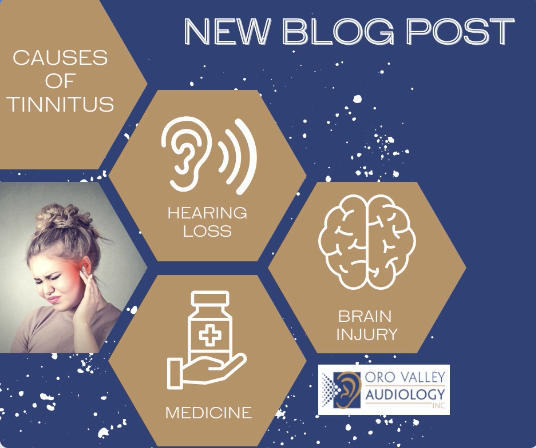As an audiologist, I was trained to identify, diagnose, and manage or treat disorders of the inner ear. One of the most common disorders I help treat and manage is called tinnitus.
Tinnitus is commonly described by my patients as ringing or buzzing in the ears that can vary from low to high-pitched. The noise can be present in one or both ears, and it may be constant or returning. Tinnitus is a common problem affecting over 50 million Americans, according to the American Tinnitus Association. It can be caused by a number of health conditions such as ear and sinus infections, hormonal changes in women, brain tumors, head injuries, diseases of the heart or blood vessels, noise-induced hearing loss, Ménière’s disease, and thyroid abnormalities. Most often, however, tinnitus is not a sign of a serious health-related issue. But, if the noise is loud or prolonged, it can affect concentration and cause emotional turmoil. Like I tell my patients, if you are suffering with tinnitus, it’s important to understand the causes and what you can do about it.
The Three Most Common Causes of Tinnitus
Hearing Loss — Ninety percent of people who have sensori-neural hearing loss also report tinnitus. This form of hearing loss is natural and tends to be bilateral (in both ears). If you are noticing that you are unable to hear high-frequency sounds, you may have age-related hearing loss. This type of hearing loss is sometimes accompanied by tinnitus.
Noise-induced hearing loss — Tinnitus can be caused by noise-induced hearing loss. This means that your tinnitus developed after extended exposure to noisy environments. People who work in factories or at construction sites or who commonly attend loud concerts may develop this type of hearing loss. Such noisy environments can slowly damage the tiny sensory hair cells in your inner ears that transmit sound to the brain, resulting in hearing loss and ringing sounds and sensations.
Traumatic Brain Injuries — Another common cause of tinnitus is traumatic brain injury (TBI). Motor vehicle accidents, falls, and assaults can damage the brain and cause the sensation of ringing or buzzing within the ears. Even if the brain injury did not cause the tinnitus, some medications used to treat cognitive problems are associated with the development of tinnitus. This type of mild TBI most often affects active-duty service members. In fact, according to an article published by Military Medicine, U.S. military members have 32.3% prevalence from all causes and can be linked to PTSD.
Treatment Options
Many times, those who suffer with tinnitus assume that there is nothing that can be done to alleviate their symptoms. This is not true. If you are experiencing a loud or consistent case of tinnitus, you should seek a professional assessment. Audiologists, like me, are trained to understand and recommend solutions for many hearing-related problems.
Although no available treatment can entirely cure tinnitus, certain management techniques can be used to lessen its effects. These techniques include retraining therapy, tinnitus activities treatment, cognitive behavioral therapy, and other psychologically based therapy approaches. The amplification of hearing aids may even work to reduce the ringing. To determine which treatment method works best for you, I will review your medical and psychological history as well as your lifestyle practices, including diet, sleep, and exercise. I may also have you complete a tinnitus assessment that measures your ability to match pitch and loudness to the sounds created by your tinnitus. The test also determines what sounds can be used to mask or suppress the phantom noises. Through these tests, audiologists can determine an approach to managing your tinnitus that works best for your specific case.
The Next Step
Why suffer with tinnitus when I am here in Tucson, Arizona to help lessen your symptoms? Reach out to Oro Valley Audiology today to set up an appointment, or schedule it yourself right now on our website! I can’t wait to meet you and help you achieve peace of mind.


